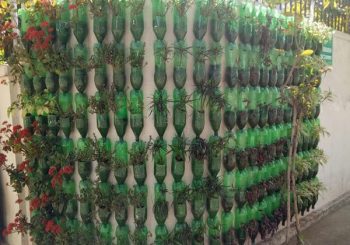Contributing Writer for Wake Up World
Unless you’ve been hiding under a rock for the last several years (unlikely, if you’re a Wake Up World reader) you’ll be aware of the plastic crisis faced by the planet. You’ll also know that excessive urbanisation means that many people live in concrete jungles, distanced from the life-affirming energy of plants.
What if there were a really cool solution to both of these problems, which put discarded plastic to a good use and enriched lives at the same time? Step forward vertical gardening with recycled plastic bottles – a brilliant idea which can be adapted to suit almost any household in any environment.
Vertical gardening isn’t new, but an example from India show how this inventive technique is truly changing lives.
The Mehra family from Amritsar were locally hot news (or actually rather cool news, as it turns out) last June when they showed off the vertical garden they had created at their home. Gitanjali Mehra, an interior designer, and her husband Rohit, a tax commissioner, used over 175,000 plastic bottles to create the garden, fixing the bottles to the exterior walls of their home and filling them with over 33 varieties of plants. The plants are irrigated using a simple drip system – and incredibly, this has lowered the internal temperature of their home by nearly a cool five degrees Celsius.
Elsewhere in Ludhiana, where Rohit works, the idea caught on quickly. Many local schools now boast lush, green, vertical gardens on their walls, as does Punjab Agriculture University, Gurdwara Dukh and even Ludhiana railway station, the first station in India to adopt this initiative. The railway authorities note that the plants not only cool the station, but also help to absorb the noise, and seem to have a calming and anti-littering effect on travellers, with incidents of littering and gutka and paan masala spitting significantly reducing. The vertical gardens are also important in reducing air pollution. Rohit has since gone on to mastermind more than 150 vertical gardening projects, changing lives across the region.
The Many Benefits of Vertical Gardening with Plastic Bottles
- You don’t need a lot of space – if you have a wall, you can have a vertical bottle garden. With space at such a premium around the world, this is a vital benefit, especially to urban and city-livers.
- The plants act as insulation, very effectively cooling the interior of the home, as the Mehra family discovered, but also keeping warmth in where the climate is cooler.
- We know that interaction with plants has a positive effect on mental health. Just enjoying the lovely view of these vertical gardens is a positive thing in itself, but the act of setting up and caring for one will have further calming benefits in a stressful world
- If you struggle with ordinary gardening due to joint or muscle problems, vertical gardening can help you enjoy nurturing plants without having to bend too much or kneel.
- Vertical gardening lends itself perfectly to organic gardening; since the plants are not so easily reached by pests, there is very little need for pesticides.
- It’s not only old plastic bottles which can be recycled for vertical gardening – you could use anything else you fancy recycling too, including old buckets, plastic guttering or piping or even discarded shoes.
- Studies have shown that plants in urban environments are important for the reduction of air pollution, a plague which is currently poisoning even our small and medium sized cities.
- The recycled bottles filled with plants help to maintain the integrity of the walls they’re attached to, protecting them from extreme weather.
Whether you create your own small-scale vertical plastic garden bottle at your home, or increasingly, whether large institutions and infrastructure giants get on board with the concept, every vertical garden created this way is recycling plastic which would otherwise be a pollutant, actively reducing local pollution, and creating a sense of wellbeing.
On an individual level or on an industrial level, the benefits of vertical gardening are too good to ignore. As Rohit Mehra points out, every little helps: “If there are 30 lakh (thousand) people in the district and everyone plants even two such planters, we will have 60 lakh plants, which will be a big push towards reducing pollution.”
Article sources:
- https://www.tribuneindia.com/news/ludhiana/vertical-garden-from-discarded-bottles-catching-everyone-s-fancy/518937.html
- https://swachhindia.ndtv.com/air-pollution-ludhiana-becomes-first-railway-station-in-india-to-have-vertical-gardens-for-cleaner-air-23483/
- https://www.tribuneindia.com/news/ludhiana/vertical-garden-from-discarded-bottles-catching-everyone-s-fancy/518937.html
About the author:
Nikki Harper is a spiritualist writer, astrologer, and current editor for Wake Up World.

If you've ever found value in our articles, we'd greatly appreciate your support by purchasing Mindful Meditation Techniques for Kids - A Practical Guide for Adults to Empower Kids with the Gift of Inner Peace and Resilience for Life.
In the spirit of mindfulness, we encourage you to choose the paperback version. Delve into its pages away from screen glare and notifications, allowing yourself to fully immerse in the transformative practices within. The physical book enriches the learning process and serves as a tangible commitment to mindfulness, easily shared among family and friends.
Over the past few years, Wake Up World has faced significant online censorship, impacting our financial ability to stay online. Instead of soliciting donations, we're exploring win-win solutions with our readers to remain financially viable. Moving into book publishing, we hope to secure ongoing funds to continue our mission. With over 8,500 articles published in the past 13 years, we are committed to keeping our content free and accessible to everyone, without resorting to a paywall.







